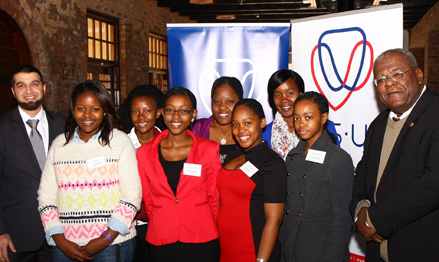|
 |
Old Mutual Investment Group’s Imfundo Trust scholars with Mr Muhammad Brey (far left) and Prof Jonathan Jansen, Vice-Chancellor and Rector of the UFS (far right).
Photo: Hannes Pieterse
22 July 2013 |
“I am one step closer to entering the corporate world as a young woman. My dream is to work for a large firm and now it is possible,” said Melody Motaung, a B Accounting first-year student. She is one of the first recipients of the Old Mutual Investment Group’s Imfundo Trust scholarship, which was launched at the university recently.
Melody is one of seven Kovsies and 91 students countrywide to benefit from the R20 million trust, aimed at empowering black professional people in the financial sector. Kovsies is now one of eight universities whose students benefit from the trust. It already empowers students from the University of Johannesburg, UNISA, Nelson Mandela Metropolitan University, University of the Western Cape, University of Fort Hare, Stellenbosch University and Rhodes University.
”The UFS embodies the excellence and innovation we are looking for in tertiary institutions,“ Mr Muhammad Brey, trustee of the trust, said during the launch. He conveyed that the main aim of the trust is to address the shortage of black professional investors in South Africa and to expand the source of suitably qualified individuals in the asset management industry.
The seven recipients, all of them female first-year students, were encouraged by the speakers to do their part in addressing South Africa’s skills shortage in the financial sector.
Prof Hendri Kroukamp, Dean of the Faculty of Economic and Management Sciences, said with the assistance of the Old Mutual Investment Group, the students – four of them B Accounting students – will help to address the shortage of chartered accountants in the country. “As qualified financial experts, they can make a big contribution.”